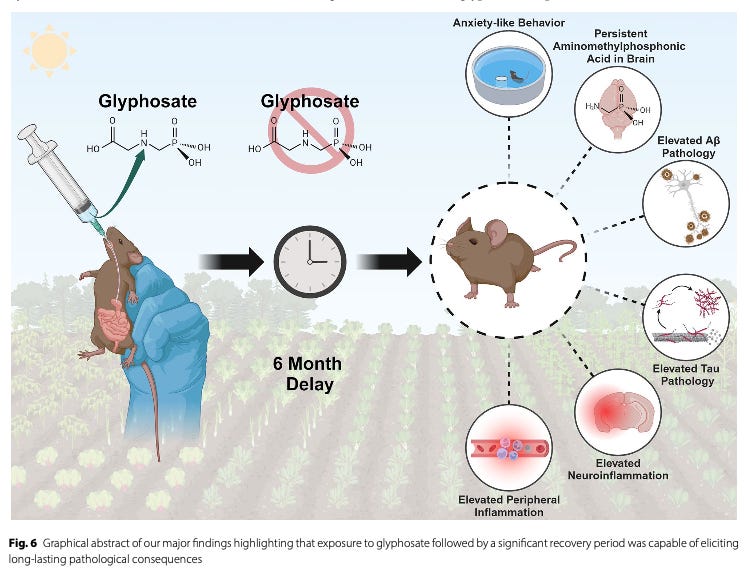Glyphosate, Choline & Brain Inflammation: What's in your salad?
There are likely chemical herbicides in your bloodstream, and you're probably choline-deficient. Here's why and what you can do about it.
Not medical advice.
In M&M #208 I spoke to Dr. Ramon Velazquez about neurodegenerative diseases, especially Alzheimer’s. We covered the basic biology and pathophysiology of Alzheimer’s during the first part of the episode. We then discussed two areas of research his lab has pursued, both of which offer practical insights for preventing neurodegeneration:
How glyphosate exposure (a common herbicide) promotes brain inflammation and facilitates neurodegeneration.
How nutritional supplementation with choline can reduce neuroinflammation and provide other benefits.
Below is a concise summary of the key findings and takeaways, starting with glyphosate.
What glyphosate does to animal brains
Glyphosate is a weed killer. Hundreds of millions of pounds are sprayed on crops annually. Its primary mode of action is to inhibit a biological pathway in weeds that helps them grow quickly. This pathway is not found in animals, which led to the presumption that it was probably safe for humans—oops.
Glyphosate is so abundant in the modern environment that many of us have detectable levels in our bloodstream right now. This will be true for most who eat a largely plant-based diet, especially if you don’t focus on organic produce or take time to wash away residual glyphosate.
As it turns out, the human gut microbiome can metabolize glyphosate into AMPA, a toxic metabolite.
Dr. Velazquez’s work has shown that when mice are exposed to glyphosate for several weeks, they display behavioral signs of anxiety, and their brains become inflamed. What’s even more troubling is that these things are observed six months after their last exposure to glyphosate. AMPA, the toxic metabolite of glyphosate, persists in the brain over this whole period. This suggests that the brain cannot clear out AMPA, which is probably triggering persistent neuroinflammation.
Something like this is likely happening to humans, too. Most of us are exposed to some amount of glyphosate throughout life. People who live in rural areas near intensive agriculture are probably exposed more, as is anyone eating lots of non-organic produce and processed foods.
We currently have no good way of removing glyphosate or AMPA from the body, so your best bet is prevention—do what you can to avoid glyphosate exposure, which will mostly mean watching what you eat. I suspect regular blood donation may also help. Studies have shown that this removes PFAS toxins from the blood. If you think about it, blood donation should pretty much reduce levels of any toxin in your bloodstream.
Basically, glyphosate exposure promotes neuroinflammation. In terms of Velazquez’s work, the other side of the coin is that choline supplementation can help reduce neuroinflammation.

Choline: Deficiency, supplementation & inflammation
Choline is a nutrient found most abundantly in animal-based foods like eggs and fish. I’m not going to go into much detail here. The body can produce choline, but not enough for optimal health, so dietary intake is important. Choline is needed for all sorts of biology, from fat metabolism and cell membrane structure to liver and muscle function, brain development, and more. As the name might suggest, choline is a precursor to acetylcholine, a key neurotransmitter in the brain.
Some basic stats and health factoids about choline that Dr. Velazquez shared:
Insufficient choline intake is clearly linked to fatty liver disease.
The “official” recommended intake is around 425 mg/day for women and 550 mg/day for me.
Choline deficiency contributes to insulin resistance.
90% of Americans are estimated to be choline deficient.
Choline supplementation has clear benefits, including reduced neuroinflammation. This is seen in choline-deficient individuals and by giving “extra” to non-deficient individuals.
As he also pointed out, consuming a few grams per day seems beneficial, which suggests that you should always take “official recommendations” with a grain of salt.
In rodent models, lifelong choline supplementation has a variety of benefits, such as improved memory, less neuroinflammation, and fewer markers of neurodegeneration. Here’s some data showing lower levels of brain plaques in mice with lifelong choline supplementation:

Other findings from his lab (in rodents) regarding the benefits of choline supplementation include:
Dietary choline intake is necessary to to prevent multiple pathologies related to things like insulin metabolism, mitochondrial function, and fructose metabolism.
Supplementing with choline during gestation and lactation (early life) reduces Alzheimer’s-like pathologies and markers of inflammation across generations.
Choline supplementation reduces co-morbidities and improves cognition in mouse models of Down’s syndrome.
Here’s a basic summary directly from Dr. Velazquez for why having adequate choline, starting early in life, is important:
RV: So in my lab, we've published a few papers in rodent models actually showing two phenomena. One, if you don't have choline in your diet, it leads to obesity, it leads to liver pathology, it increases plaques and tangles in the brain and neuroinflammation. That's if [mice] don’t have any choline in the diet. The opposite is true. If you supplement with more choline, you actually reduce the amyloid beta and the pathology that you see in Alzheimer's disease. However, it has to start pretty early. If you try to use it as an intervention where the pathology has already began, it's kind of too late. But the evidence does show that it needs to be done throughout your life to truly have profound benefits in prevention and also in healthy cognitive aging.
From M&M #208
Avoid toxins, get adequate nutrition
This should be obvious. The problem is that most people probably have little awareness that they’re exposed to glyphosate, that it can lead to neuroinflammation, or what can be done to avoid it. What’s even more troubling is that most mainstream health institutions and many physicians explicitly recommend plant-based diets to people. With respect to glyphosate and choline, this can be a double-whammy: glyphosate is sprayed onto plant crops (the primary vector of exposure), and choline is found primarily in animal-based foods like eggs.
Choline is not even on the average person’s nutritional radar. Most probably have no idea what it is or why it’s needed. It isn’t even found on most nutrition labels. Here's an AI-assisted summary of the top ten whole foods, ranked by choline content. Notice that most are animal foods and that choline is generally less bioavailable in plant foods. (Take the precise numerical values with a grain of salt, but these results are directionally accurate.)
The only way to know these things is to learn about them directly. You can’t count on formal schooling (even medical school), your physician, or anyone else to spoon-feed this information to you. Controlling your information diet is upstream of fixing your physical diet.
If you’re lucky, maybe a friend will share this information. In fact, if you’re reading this, please do:
To learn more:
Podcast: Glyphosate, Choline & Alzheimer's: Toxins & Nutrition to Prevent Neurodegeneration | Ramon Velazquez
Paper: Glyphosate exposure exacerbates neuroinflammation and Alzheimer’s disease-like pathology despite a 6-month recovery period in mice
Paper: Lifelong choline supplementation ameliorates Alzheimer’s disease pathology and associated cognitive deficits by attenuating microglia activation










The blood donation thing is pretty wild. Would be interested in a deeper dive on that.